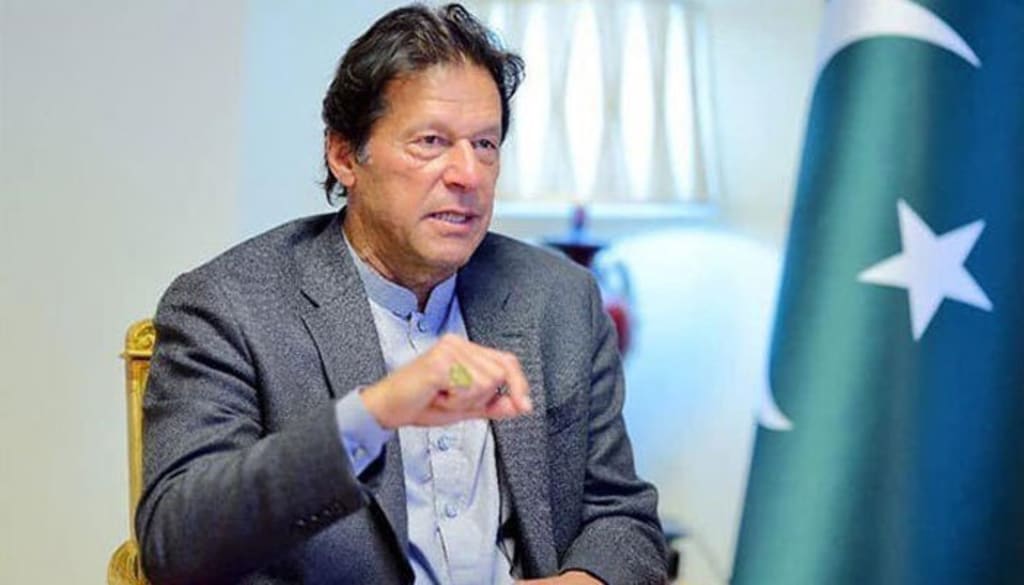
Prime Minister Imran Khan remarked on Friday that Chief Pakistan Army Staff General Qamar Javed Bajwa requested that I refrain from referring to JUI-F leader Maulana Fazlur Rehman as "diesel."
The premier addressed a crowd in Lower Dir at Balambat Ground in Timargara that he informed Gen Bajwa that he is not calling Fazl "diesel," but that the population has.
"I want to send the message that when a person bends down in front of someone, they lose their self-respect; and when a nation bows down in front of someone, no one respects the country or its passport," the prime minister added.
Since his entry into politics 25 years ago, the Prime Minister has concentrated on three things, he told the enraged audience.
"I want to make our nation self-sufficient, a welfare state, and a country where law and justice reign," Prime Minister Imran addressed the enraged throng.
"These three principles were accepted from Riasat-e-Madina," he added, adding that they were part of the PTI's agenda.
PM Imran claimed the leaders of the three "stooges" — the JUI-F, PPP, and PML-N — had been dominating the county for the last 30-35 years.
"These three mortgaged Pakistan," he stated, explaining why the world does not recognise Pakistan's green passport today.
'How is Fazl going to fix the Pakistani army?'
Fazl, who is also the president of the PDM, has previously stated that when he gets into power, he will repair the institution, according to PM. The Prime Minister, on the other hand, said that the PDM leader meant "he wants to repair the Pakistan Army."
He chastised him for making this statement, claiming that Pakistan's survival is due to its strong army.
"Muslim nations such as Somalia, Syria, and Afghanistan are in turmoil; nevertheless, Pakistan is safe because we have the world's most strong army," he remarked.
Fazl's assertion was questioned, and he was asked how he [Fazl] intended to reform the institute.
"These three politicians damage all the institutions they try to reform," Prime Minister Imran asserted, pointing out that they assaulted Pakistan's courts, bribed judges, chased away the Supreme Court Chief Justice, and engaged in yellow journalism.
Effort for Pakistan
As Pakistan's prime minister, Imran Khan wants to plant 10 billion trees in the next five years.
It's a bigger version of his party's "billion tree tsunami," which restored 350,000 hectares of woodland in Khyber Pakhtunkhwa province.
On Thursday, the cricketer-turned-politician declared victory in the election, albeit the PTI is anticipated to govern through coalition partners. While his campaign was mostly centred on anti-corruption, it also promised a number of environmental projects.
Green growth was important, according to Malik Amin Aslam, who penned the PTI manifesto's climate change part and is expected to become environment minister.
"On the green platform, the PTI is the only party that has taken a brave step," he remarked. "Because Pakistan bears the brunt of climate change, I believe that climate preparation, such as ensuring that our growth is completely climate compatible and that our infrastructure is robust to climatic shocks, would be a top priority."
PTI issued a list of ten calls to action for Pakistanis, including "plant a tree" and "save water and electricity," as one of its first moves after the election.
Dam-building and water conservation measures, as well as green construction rules and sustainable energy assistance, are among the objectives in its platform.
It also advocates expanded use of indigenous coal deposits from Thar region, citing a desire to minimise reliance on imports. China has made a significant investment in coal, which Pakistan has dubbed a "golden chance."
According to Aslam, these projects are already underway, and PTI's priority will be to ensure that they meet environmental requirements while growing Pakistan's hydro, wind, and solar resources.
This was the strategy used by the provincial administration of Khyber Pakhtunkhwa, where PTI pushed for the installation of 300 micro hydropower units, he added.
Khan criticised the federal government at the time in a 2015 interview with Climate Home News for providing "paltry finances" to its climate change ministry - less than $400,000 that year.
Khan also discussed the effects of climate change on Pakistan, and he urged on industrialised nations to take responsibility for their previous pollution.
"Unfortunately, we do not have the luxury of wasting time on our side when it comes to climate change." "We are living in the period of critical climate adaption in Pakistan," he remarked.
About the Creator
kinnemoon
story writter






Comments
There are no comments for this story
Be the first to respond and start the conversation.